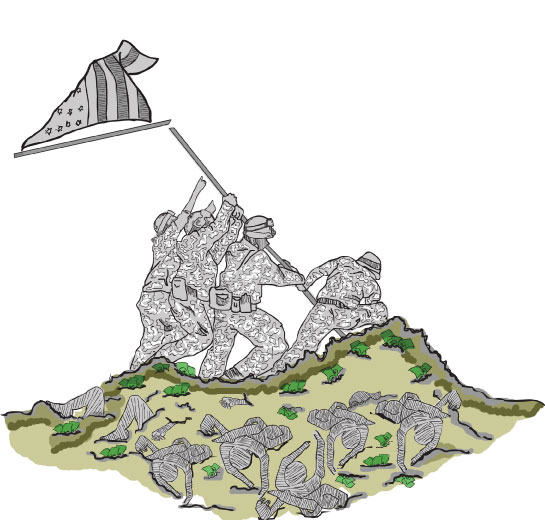After eight years, more than $200 billion spent and tens of thousands of American and Afghani deaths, the general in charge of military operations in Afghanistan recently described the situation as “serious” and “deteriorating.” Given this grave assessment and plummeting public support, President Barack Obama has a pivotal decision to make: whether to increase troop levels or change course entirely.
Much has been made of the parallels between the wars in Afghanistan and in Vietnam. Obama’s impending decision is reminiscent of the one former President Richard Nixon had to make upon taking office in 1969. Where Nixon failed, Obama can succeed by taking a history lesson and ordering the gradual withdrawal of American troops.
One of the most pertinent and enduring lessons from Vietnam was that more money and more troops don’t always ensure victory, and that unchecked American hubris is no substitute for smart foreign policy.
If Obama follows the advice of his generals in Afghanistan and increases troop levels, he’ll risk repeating the mistakes of Vietnam by investing massive amounts of energy and money in a war that currently appears unwinnable.
Presumably, a greatly weakened Taliban and long-term stability of a democratic government would constitute a “win” in Afghanistan. Yet the current government supported by the United States is led by a man, Hamid Karzai, whom John McCain went so far as to call corrupt.
There is mounting evidence that Karzai’s government may have resorted to election fraud in August’s presidential election, including numerous allegations, and in some cases photos, of ballot stuffing ““ not exactly what you want from the government of a newly installed fledgling democracy.
Consider also that the Taliban has mounted a resurgence of late, and that July and August were the bloodiest years of war since Operation Enduring Freedom began in 2001. That hypothetical “win” just doesn’t seem very likely to happen.
Our current commander of U.S. forces in Afghanistan, Gen. Stanley McChrystal, disagrees. While I don’t pretend to know more about our military outlook than he, his assessment of what it would take raises some eyebrows.
He claims that it would require 500,000 additional troops over five years and billions more dollars to win in Afghanistan, and even then he says victory isn’t a certainty.
That increase could propel troop levels to where they were at their highest point during the Vietnam War. The question has to be asked: Is it worth it?
The prospect of the Taliban’s return to power in Afghanistan is a blow to U.S. security and interests abroad, yet there are numerous oppressive regimes worldwide that support terrorism. It’s not worth investing hundreds of thousands of additional troops and billions of additional dollars to fight one of them.
Some would argue that Afghanistan is a terrorist hub of sorts, and likewise deserves more attention. Yet faced with a government that has proven incapable of supporting itself despite massive foreign support and a remarkably resilient Taliban, the chances of long-term victory seem slim.
And that’s saying nothing of the moral question of whether turning foreign countries into political chessboards is responsible international policy.
Obama faces a difficult decision politically. He’s been labeled weak on foreign policy by his detractors, and retracting troops would only provide fodder for their argument.
The president would also likely have to go against the advice of his generals, an uncommon and politically prickly prospect. The worst-case scenario, that an emboldened Taliban or al-Qaida commit acts of terrorism on U.S. soil, could cost Obama an election and greatly damage his legacy.
So, Obama faces a decision that could come to define his presidency, for better or for worse. However, if history provides any insight, it shouldn’t be a hard one. In the face of similar obstacles in Vietnam ““ a corrupt, weak government and difficulties adapting our military structure to anti-insurgency activities ““ Lyndon Johnson and Nixon repeatedly chose to escalate the military effort until it became too unpopular to be politically viable.
Vietnam is now considered the greatest military failure in U.S. history, a culture shock at home and a stain on our image worldwide. If Obama takes the same route, Afghanistan risks becoming his Vietnam, but much longer and more expensive.
A gradual pullout, while leaving enough troops to protect the cities until Karzai’s government can do the job, is the prudent option. Investing many more years, hundreds of thousands of additional troops and billions of additional dollars to fight a war with an increasingly bleak outlook doesn’t make sense.
Upon marking the end of the first Iraq War in 1991, President George H.W. Bush said, “The specter of Vietnam has been buried forever in the desert sands of the Arabian Peninsula.”
Obama can choose to gamble on bad odds and drastically escalate the war, but if the president loses that bet, Afghanistan will linger as a specter for future generations. Or he can have the foresight that many before him lacked and end a wasteful and unwinnable war.
E-mail Wright at gwright@media.ucla.edu. Send general comments to viewpoint@media.ucla.edu.
